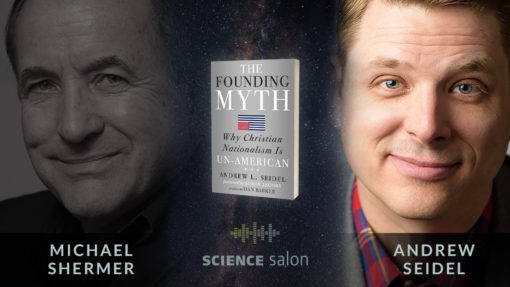In episode 217, Michael Shermer speaks with Mary Grabar about her books Debunking the 1619 Project: Exposing the Plan to Divide America and Debunking Howard Zinn: Exposing the Fake History That Turned a Generation Against America.
Tags
-
browse by topic
civil rights
eSkeptic for October 12, 2021
Jason D. Hill — We Have Overcome: An Immigrant’s Letter to The American People

In episode 158 Michael Shermer speaks with Jason D. Hill, a black immigrant from Jamaica, about his eloquent appreciation of the American Dream, and why his adopted nation remains the most noble experiment in enabling the pursuit of happiness.
eSkeptic for February 20, 2021
In episode 158 Michael Shermer speaks with Jason D. Hill, a black immigrant from Jamaica, about his eloquent appreciation of the American Dream, and why his adopted nation remains the most noble experiment in enabling the pursuit of happiness. PLUS: In the 7th CUPES report, we ask: across the political spectrum, how knowledgeable are people when it comes to the available data on fatal police shootings of Black Americans?
Andrew Seidel — The Founding Myth: Why Christian Nationalism is Un-American

Was America founded on Judeo-Christian principles? Are the Ten Commandments the basis for American law? What, exactly, was the role of religion in America’s founding? Shermer speaks with constitutional attorney and scholar at the Freedom from Religion Foundation (FFRF) Andrew L. Seidel who argues that America was not built on the Bible and that Christian nationalism is, in fact, un-American.
eSkeptic for May 2, 2018

Nathan H. Lents and Lila Kazemian discuss evidence from a variety of disciplines as disparate as animal behavior and moral theology that point toward more humane, efficient, and effective responses to crime and punishment that work in concert, rather than in conflict, with our evolutionary psychology.
What Biology Can Teach Us About Crime and Justice

Nathan H. Lents and Lila Kazemian discuss evidence from a variety of disciplines as disparate as animal behavior and moral theology that point toward more humane, efficient, and effective responses to crime and punishment that work in concert, rather than in conflict, with our evolutionary psychology.
The Moral Arc: How Science Leads Humanity Toward Truth, Justice, and Freedom
In this provocative and compelling talk—that includes brief histories of freedom rights, women’s rights, gay rights, and animal rights, along with considerations of the nature of evil and moral regress—Shermer explains how scientific ways of thinking have moved us ever closer to a more just world.
SKEPTIC App
Whether at home or on the go, the SKEPTIC App is the easiest way to read your favorite articles. Within the app, users can purchase the current issue and back issues. Download the app today and get a 30-day free trial subscription.








